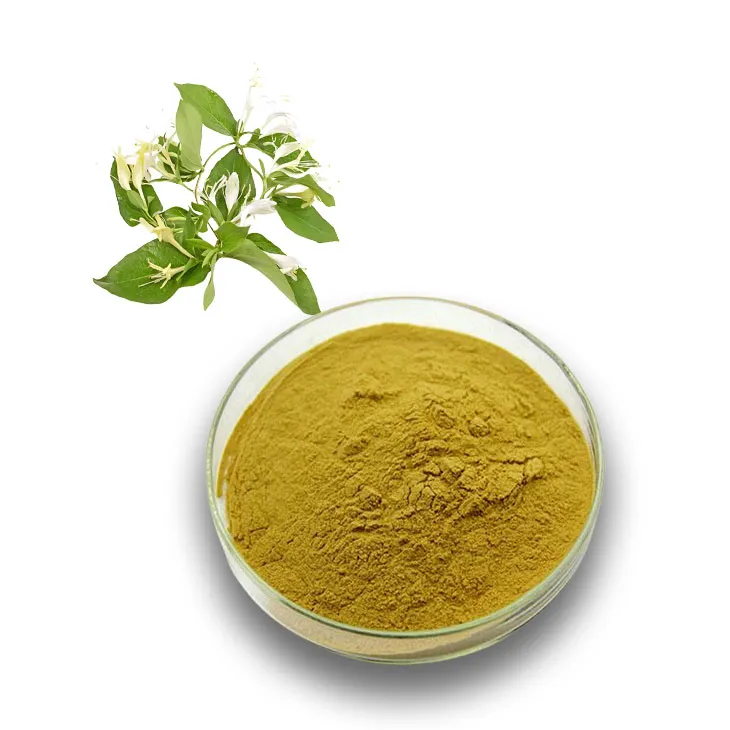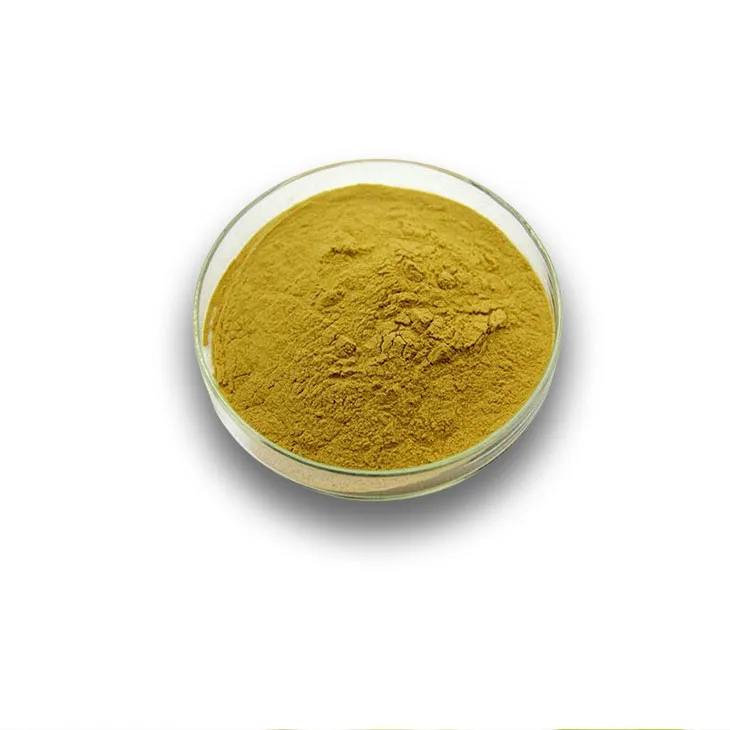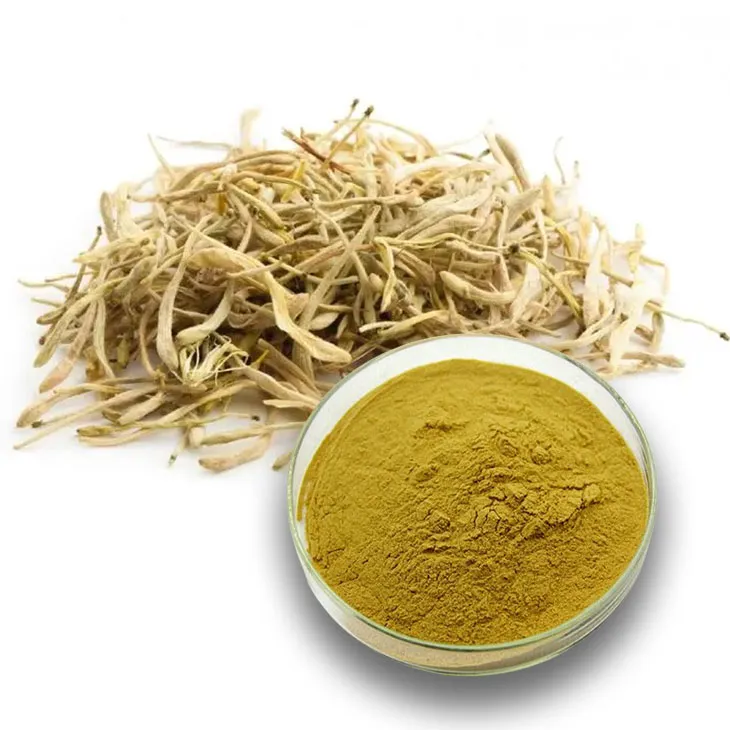- 0086-571-85302990
- sales@greenskybio.com
10 Amazing Health Benefits of Honeysuckle Pollen.
2024-11-12

1. Rich in Antioxidants
Honeysuckle Pollen is abundant in antioxidants. Antioxidants play a crucial role in maintaining our body's health. They combat free radicals, which are unstable molecules that can cause damage to our cells. Free radicals are produced during normal metabolic processes, but also due to environmental factors such as pollution, radiation, and smoking.
The antioxidants in Honeysuckle Pollen help to neutralize these free radicals, reducing the risk of various chronic diseases. For example, they can help prevent heart disease by preventing the oxidation of LDL (low - density lipoprotein) cholesterol. Oxidized LDL cholesterol is more likely to build up in the arteries, leading to atherosclerosis.
Moreover, antioxidants in Honeysuckle Pollen also contribute to skin health. They can slow down the aging process of the skin by protecting skin cells from free - radical damage. This may result in fewer wrinkles, improved skin elasticity, and a more youthful complexion.

2. Boosts the Immune System
The immune system is our body's defense mechanism against diseases. Honeysuckle pollen contains various nutrients and bioactive compounds that can enhance the immune system.
It is rich in vitamins, such as vitamin C, which is well - known for its immune - boosting properties. Vitamin C stimulates the production of white blood cells, which are essential for fighting off infections. Additionally, honeysuckle pollen may contain other immune - modulating substances, such as polysaccharides.
Regular consumption of honeysuckle pollen can help the body to better resist infections caused by bacteria, viruses, and fungi. It can also reduce the frequency and severity of colds and flu, making us more resilient during the flu season.

3. Anti - Inflammatory Properties
Inflammation is a natural response of the body to injury or infection. However, chronic inflammation can lead to a variety of health problems, including arthritis, heart disease, and certain cancers.
Honeysuckle pollen has anti - inflammatory properties. It contains compounds that can inhibit the production of inflammatory mediators in the body, such as cytokines and prostaglandins.
For those suffering from inflammatory conditions like arthritis, honeysuckle pollen may help to reduce pain and swelling. It can also improve joint mobility and function over time. In addition, its anti - inflammatory effects may contribute to overall cardiovascular health by reducing inflammation in the blood vessels.

4. Promotes Digestive Health
Good digestive health is essential for overall well - being. Honeysuckle pollen can play a positive role in promoting digestion.
It contains dietary fiber, which helps to add bulk to the stool and promotes regular bowel movements. This can prevent constipation and keep the digestive system functioning smoothly.
Furthermore, honeysuckle pollen may also contain enzymes or other substances that can aid in the breakdown and absorption of nutrients. It can stimulate the secretion of digestive juices in the stomach and intestines, improving the efficiency of digestion.
Some studies suggest that honeysuckle pollen may also have a prebiotic effect. It can promote the growth of beneficial gut bacteria, such as bifidobacteria and lactobacilli. These beneficial bacteria are important for maintaining a healthy gut microbiota, which is linked to improved digestion, enhanced immune function, and even mental health.

5. Anti - Allergic Effects
Allergies are becoming increasingly common in modern society. Honeysuckle pollen may offer some relief for allergy sufferers.
Although honeysuckle itself is a pollen - producing plant and may cause allergies in some people, the pollen extract may have anti - allergic properties. It may work by modulating the immune system's response to allergens.
Some research indicates that honeysuckle pollen can reduce the production of IgE antibodies, which are involved in the allergic reaction. By reducing the level of IgE antibodies, it may decrease the severity of allergic symptoms such as sneezing, itching, and runny nose.
However, it should be noted that for people with severe pollen allergies, especially those who are allergic to honeysuckle pollen, it is necessary to be cautious when using products containing honeysuckle pollen.
6. Cardiovascular Health
The health of the cardiovascular system is of utmost importance. Honeysuckle pollen can contribute to cardiovascular health in several ways.
As mentioned before, its antioxidant properties can prevent the oxidation of LDL cholesterol, reducing the risk of atherosclerosis. Atherosclerosis is a major cause of heart attacks and strokes.
It may also have a beneficial effect on blood pressure. Some compounds in honeysuckle pollen may help to relax blood vessels, reducing peripheral resistance and thus lowering blood pressure. Normal blood pressure is essential for maintaining the normal function of the heart and blood vessels.
Moreover, honeysuckle pollen may improve blood lipid profiles by reducing triglyceride levels and increasing HDL (high - density lipoprotein) cholesterol levels. HDL cholesterol is often referred to as "good" cholesterol because it helps to remove excess cholesterol from the bloodstream.
7. Anti - Cancer Potential
While more research is needed, there are indications that honeysuckle pollen may have anti - cancer potential.
The antioxidants in honeysuckle pollen can protect cells from DNA damage, which is an important step in cancer prevention. DNA damage can lead to mutations in cells, which may cause them to become cancerous.
Some studies have also found that certain compounds in honeysuckle pollen may have anti - proliferative effects on cancer cells. This means that they can inhibit the growth and division of cancer cells. However, it is important to note that honeysuckle pollen should not be considered as a substitute for conventional cancer treatments, but rather as a complementary approach.
8. Respiratory Health
Honeysuckle pollen can be beneficial for respiratory health.
It has expectorant properties, which means it can help to loosen and expel mucus from the lungs. This can be especially useful for people with respiratory conditions such as bronchitis or coughs.
Moreover, its anti - inflammatory and antioxidant properties can also protect the respiratory tissues from damage. It can reduce inflammation in the airways, improving breathing and reducing the risk of respiratory infections.
9. Anti - Stress and Adaptogenic Properties
In modern life, stress has become a common problem. Honeysuckle pollen may have anti - stress and adaptogenic properties.
Some substances in honeysuckle pollen may help the body to adapt to stress more effectively. They can regulate the body's stress response system, such as the hypothalamic - pituitary - adrenal (HPA) axis.
By reducing stress levels, honeysuckle pollen may also have a positive impact on mental health. It may help to improve mood, reduce anxiety, and increase overall well - being.
10. Nutritional Value
Honeysuckle pollen is a rich source of nutrients. It contains a variety of vitamins, such as vitamin B complex, which is important for energy metabolism and nerve function.
It also contains minerals like potassium, magnesium, and calcium. Potassium is essential for maintaining normal heart function and fluid balance in the body. Magnesium is involved in many enzymatic reactions and is important for muscle and nerve function. Calcium is crucial for strong bones and teeth.
In addition, honeysuckle pollen contains amino acids, which are the building blocks of proteins. These nutrients make honeysuckle pollen a valuable addition to a healthy diet.
FAQ:
Q1: What are the antioxidant properties of honeysuckle pollen?
Antioxidants in honeysuckle pollen can neutralize free radicals in the body. Free radicals are unstable molecules that can damage cells and contribute to various health problems like aging and certain diseases. The antioxidant components in honeysuckle pollen help prevent this damage by donating electrons to the free radicals, making them more stable and less harmful.
Q2: How does honeysuckle pollen promote digestion?
Honeysuckle pollen contains certain enzymes and fibers that are beneficial for digestion. These components can help break down food more efficiently in the digestive tract. The enzymes can act on complex food molecules, while the fibers add bulk to the stool, promoting regular bowel movements and preventing constipation.
Q3: Can honeysuckle pollen boost the immune system?
Yes, it can. Honeysuckle pollen contains nutrients and bioactive compounds that can enhance the function of the immune system. It may stimulate the production of immune cells such as white blood cells, which play a crucial role in defending the body against pathogens like bacteria and viruses.
Q4: Is honeysuckle pollen safe for everyone to consume?
While honeysuckle pollen has many potential health benefits, it may not be suitable for everyone. Some people may be allergic to it. Those with pollen allergies in general should be cautious when consuming honeysuckle pollen. Also, pregnant or breastfeeding women should consult a healthcare provider before using it to ensure its safety.
Q5: How can one incorporate honeysuckle pollen into their diet?
Honeysuckle pollen can be added to various foods. It can be sprinkled on top of cereals, yogurt, or smoothies. Some people also use it in baking, adding it to muffin or bread recipes. However, it should be used in moderation as excessive consumption may have potential side effects.
Related literature
- The Nutritional and Medicinal Value of Honeysuckle Pollen"
- "Honeysuckle Pollen: A Natural Source of Health Benefits"
- "Beneficial Effects of Honeysuckle Pollen on Human Health"
- ▶ Hesperidin
- ▶ Citrus Bioflavonoids
- ▶ Plant Extract
- ▶ lycopene
- ▶ Diosmin
- ▶ Grape seed extract
- ▶ Sea buckthorn Juice Powder
- ▶ Fruit Juice Powder
- ▶ Hops Extract
- ▶ Artichoke Extract
- ▶ Mushroom extract
- ▶ Astaxanthin
- ▶ Green Tea Extract
- ▶ Curcumin
- ▶ Horse Chestnut Extract
- ▶ Other Product
- ▶ Boswellia Serrata Extract
- ▶ Resveratrol
- ▶ Marigold Extract
- ▶ Grape Leaf Extract
- ▶ New Product
- ▶ Aminolevulinic acid
- ▶ Cranberry Extract
- ▶ Red Yeast Rice
- ▶ Red Wine Extract
-
Acerola Extract
2024-11-12
-
Cassia Seed Extract
2024-11-12
-
Boswellia Serrata Extract
2024-11-12
-
Fig Extract
2024-11-12
-
Cactus Extract
2024-11-12
-
Nettle leaf extract
2024-11-12
-
Grapefruit Seed Extract Powder
2024-11-12
-
Hesperidin
2024-11-12
-
Saffron Extract Powder
2024-11-12
-
Cocoa Extract
2024-11-12





















